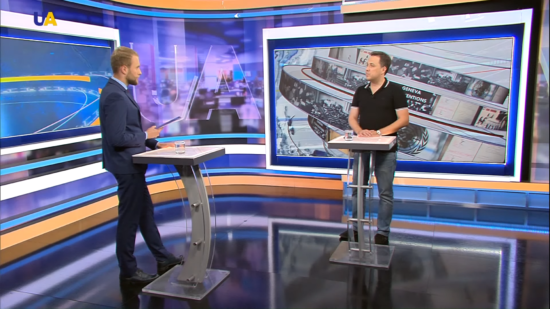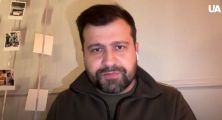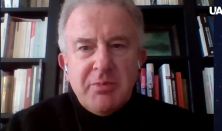On August 12th, 70 years ago, following the devastation of the Second World War, the diplomatic conference of the International Committee of the Red Cross adopted the Geneva Conventions, also known as the Laws of War. The convention describes how in times of war nations should treat wounded and sick, prisoners of war, and civilians. They have been signed by every country in the world.
On this program, we’re going to discuss how relevant are the conventions, first of all in view of the fact that the war between Ukraine has been going on for more than five years. Joining us in the studio, to expand on the topic, Mykola Kapitonenko director of the center for international studies NGO.
— So I briefly explained the audience what are the Geneva Conventions about and now let’s continue about their effectiveness. So we do know that the four conventions were adopted in 1949 after the atrocities of the Second World War, but in fact, two of them were adopted even earlier, in 1929: those about wounded and sick and prisoners of war. So looks like no one had the urge to adhere to these conventions before and during one of the biggest tragedies in the world’s history, Second World War. What are your thoughts on that?
— I think that Geneva conventions and other instruments of International Law are a very good illustration of how International Law practices is maybe different from political reality and military struggle in different countries. It is a widespread belief since the First World War that the International Law can minimize losses, to minimize risks, and to make war among states obsolete or at least less likely. The reality proves to be different and all the conventions, all the international instruments that have been created following the First World War have been ignored or violated during the Second World War, the biggest conflict in history. The same approach has been taken after the Second World War. Again, states believed that it could be possible to regulate international politics by legal instruments and the result was Geneva Conventions, which has been the common denominator what states have been thinking about what is applicable or not during the times of military conflicts. It does not mean that all the states that signed the conventions have never violated it. But it is a signal of a certain line between what is right and what is wrong in international politics.
— Yes, we will talk about the violations because we mentioned that every single country in the world is one of the signatories of these four Geneva conventions. So what happened in 1949, the conventions were adopted and the ratification process has been going until the 2000s until the last country would ratify it. But do they work, actually? This is now core question because we realized that four conventions are the core of modern International humanitarian law, but we also realized that after the Second World War no one would want any other conflict like that to start. So far, of course, we don’t have any other conflict of such a tremendous scale, but still, those norms were adopted to regulate something and we do see that conflicts are going on, but does anyone adhere to the rules?
— We have to bear in mind at least two things. One of them is that International Law generally does not work the way Internal Law does.
-So there are no clear statistics?
— Yes. This is more of a set of principles that states should adhere to, but it does not necessarily mean that those of them which violate them are going to be punished in any significant way. Because of this aspect we see lots of military conflicts, we see lots of violations, so basic principles of International Law or of specific conventions or other norms and agreements. So when we say that there is an International Law to which almost 200 countries have prescribed, it does not mean that it will be absolutely working.
— Plus, you mentioned that there is no punishment for it.
— Right.
— But is there a purpose, if Geneva conventions are breached by some country, the participant of the conflict if the country is violating it, is it a purpose to drag the violator into the International Criminal Court?
— Formally, it is. But in practice, in most cases, it is just a signal that something is going wrong. It does not mean that the country will be punished and another thing I want to draw your attention to is the fact that we are living in a different world, which is polar from the one we had before the Second World War or we had in 1949 right after it. I mean the world of conflicts is different. The wars that were common in the world of 1949 are no longer typical. No classic wars between states when one state declares war in another and they fight according to certain rules. Nothings like this we’re observing today. Most conflicts are internal, taking place in the territory of a specific state sometimes involving neighbouring states, big powers, and things like this.
— We are mostly talking about international conflict, involving two different states. But you are right that now the country does not really need to declare war and also there is another vision as hybrid war. Of course, the most important issue of this conversation is to touch Ukraine’s reality, but before that, let’s question the latest examples of conflicts, the conflicts in Afghanistan 2001-2002, the war in Iraq, the conflict in Southern Lebanon and the conflict between Russia and Georgia that took place in 2008. Did they fully apply with the Conventions?
— Certainly, we may add a dozen conflicts. According to simple statistics, we have, annually we are observing about 25-30 militarized international disputes, which are major conflicts which have a military component. Only one or two out of them are classic interstate wars, wars between two states. The vast majority of conversations are…
— What states are you talking about?
— I mean, you can recall Indian and Pakistani conflict which is a classical conflict between two states, the Georgian-Russian war in 2008 is also classical to the conflicts which involve two states. Although the majority of other conflicts are not looking like this, they are not involving classical interstate struggle. They are asymmetric, hybrid, the internal. It is very difficult to draw a line between combatants and non-combatants. Actually, Geneva Conventions are mostly about the protection of non-combatants.
— As you mentioned, the conflict between Russia and Georgia, of course, involved two states, as I understand, officially. Does it comply with the Conventions?
— Basically, it is illegal to wage war against another country. So, it is violating international norms and basic principles of international law. As far as I remember, there were cases when rights of non-prisoners have been violated, when military power has been used unproportionally that mean that those actions are taken by Russia during this conflict has been violating Geneva Convention. But this is what I am trying to draw attention to that. This is a different world we are living in today. So, the conflict between Russia and Georgia is very different in many ways from those conflicts that the authors of the Convention had in mind. Possible conflicts that they wanted to prevent or to regulate because it is taking place in very different settings.
— The basic principle is the rights of non-combatants and prisoners that should be protected.
— Basically, if the person is not participating in war shouldn’t be targeted.
— Or even the person who has been participating, but surrendered has to be treated without any threat to his or her dignity or security. This is what convention is about. But it can certainly not be observed even during the large-scale civil wars and the conflicts like those we are observing in Syria. When we are talking not only about the selected cases of violation of the convention, but when we are talking about mass killings and the strategies which on purpose violate the principles which are put into the Geneva Convention.
— Now it is time to expend a little bit on Ukraine-Russia topic and since we are saying that the 1949 Geneva Convention also applies to the occupation of parts of the state’s territory. So, now we can touch on Crimea and touch on Donbas. Basically Luhansk and Donetsk regions. They are kind of formed fake states, but for sure we can touch on Crimea as an example of true occupation.
— Right. Crimea is an occupied territory and there is no military conflict going on there because of that more emphasis is put not on the rights of combatants or non-combatants but on the human rights of the people that are under occupation. Because according to international law, an occupying state must observe, protect and guarantee all the rights of the human rights of the people who are living in the occupied territory. So the cases of the Crimea and Donbas are slightly different. We have to draw maximum attention is to the way Russia behaves in Donbas because this is the place where the Geneva Conventions are obviously violated. But the key problem for us is certainly to somehow judicially prove that Russia is responsible for everything which is taking place there. We have a long-lasting discussion in Ukraine about how the situation is viewed from the point of view of international law. Whether it is occupied territory or probably Russia has effective control over those territories, or there is probably some other sort of hybrid situation when Russia is clearly responsible politically. And everybody in Europe, in the US and in the world understands that Russia is responsive.
— How would you evaluate the Ukraine’s efforts nowadays to defend itself in international courts because we do know that there are numerous cases already filed against Russia, we do know that every other case has its own progress so we cannot just focus on every single one because we are running out of time but how do you evaluate Ukraine’s efforts now?
— In my view, it is difficult mainly because we are living in a historical period when power means much more than the law. There are different periods in international history and currently, there is the one when international law is not so powerful as usually. Because of that, we have to more rely on the constellation of power and balance of power and things like those. And there are very few things which we can actually do in international courts or any other instances of juridical power. That’s why I think that we have to do this because this is one of the major ways a weak power can win against a strong one. We have an asymmetrical conflict with Russia but we have to be aware of the fact that expectations should be lower. Because under present political circumstances there is not so much Ukraine can do, even it has brilliant arguments in what concerns the legal sphere.
— So courts cannot solve the war. Yes, I understood this. Let’s also touch on the 24 Ukrainian sailors who are now prisoners of war. They were captured near the Kerch straight in November last year and they are being held in Russia in the Lefortovo pre-trial detention center. So on March, 12, report of the UN’s Office of the High Commissioner for human rights stated that Russia breached international humanitarian law and called the 24 captive Ukrainian sailors prisoners of war. So we do know that also UCEF, if I’m not mistaken, also referred to the 24 entertained sailors as prisoners of war. They themselves recognized themselves as prisoners of war. So this is like a very widely-known fact but does it help?
— It does not because this is the case which demonstrates quite vividly the difference in approaches, I mean the Russian approach and the approach of the rest of the world to the situation we have over the Crimea.
— But then there was the sentence of the International Court for Human Rights. I mean they have to be released immediately they had to be released a long time ago. So now the world is observing the situation when Russia is not adhering to any international norms that everyone has agreed on and passed. What should be Ukraine’s actions on this question and what should be the response from the world, what should be the proper response because as far as I understand you mean that Ukraine cannot stand on its own in this conflict?
— In my view, the basic Ukrainian strategy in this particular case and in other cases which can also surface because of the situation with the Crimea is to try to make the price of occupation of the Crimea as high as possible, including those in the legal sphere because we will face the impossibility of making Russia do anything which will be according to the law, even under the pressure of sanctions because for the Russian side to accept this view of the situation may shortly lead to the acceptance of the fact that Crimea has been occupied illegally. Because of that Russia cannot afford itself to follow international law in this particular case. We together with the international community must make the price for not adhering to international law for Russia as high as possible.
— Well, since we discussed that this is the 70th anniversary of the Geneva Conventions as being adopted do you think that the world is facing the need of developing in some kind of new peace treaties if the Geneva Conventions didn’t prove their effectiveness in the nowadays world?
— I believe that the problem is not in the Geneva Conventions. They are very good from a legal point of view. The problem is with international politics with the political component. That states when they do not think that international order is okay for them, they will violate international norms. So the issue number one right now is to try to find the political solution to the situation we have in a security sphere in Europe or globally to find a new balance of power which would correspond to the balance of interests or vice-versa. When that is accomplished the states will follow international norms and rules just because it will be more beneficial for them. Before it has been achieved they will keep violating international norms and it is actually very little we can do about that.













